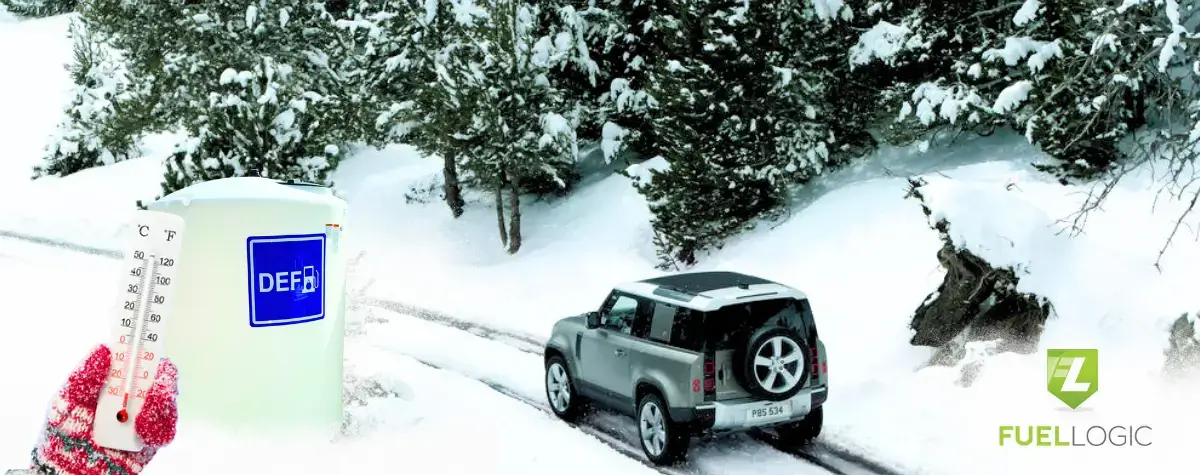Diesel Exhaust Fluid is a mixture of deionized water and urea. This solution is injected into the exhaust stream of diesel vehicles through a system known as Selective Catalytic Reduction (SCR). Its primary purpose is to tackle harmful nitrogen oxide (NOx) gases produced during diesel engine operation.
A chemical reaction occurs within the SCR system when DEF is introduced into the exhaust. As the vehicle heats up, the urea transforms into ammonia (NH3), an alkaline compound of nitrogen and hydrogen. Depending on the specific car and the type of fuel used, DEF can contribute to reducing NOx emissions by an impressive 70-95%.
TABLE OF CONTENTS
- Common Misconceptions About DEF Freezing
- DEF Freezing Point: At What Temperature Does DEF Freeze?
- Consequences of DEF Freezing
- How to Prevent DEF Freezing?
- Factors Influencing Freezing Point
- Tips for Handling DEF in Cold Weather
- Environmental Impact of DEF in Cold Weather Conditions
- Now you know the temperature DEF freezes – what's next?
- How do you winterize diesel exhaust fluid (DEF)?
- How should DEF be stored in cold weather?
- Is there a risk of DEF quality degradation after freezing?
- Is there anything to put in DEF to keep it from freezing?
- Is DEF still good after it freezes?

An important question arises: At what temperature does DEF freeze? Proper knowledge is essential because neglecting DEF freezing can lead to several engine problems and increased harmful emissions.
DEF (Diesel Exhaust Fluid) can solidify in low temperatures, posing a risk to the Selective Catalytic Reduction (SCR) system’s function. The exhaust filtration systems become less effective in the cold due to the frozen DEF, causing a ten-times rise in harmful vehicular emissions.
Common Misconceptions About DEF Freezing
There are a few common misconceptions about Diesel Exhaust Fluid (DEF) freezing that are important to clear up. So, let’s discuss them:
Frozen DEF Does Not Convert to its Normal State
There is a misconception that when Diesel Exhaust Fluid (DEF) freezes, it causes permanent damage and does not return to its regular status. However, the fluid can often return to normal once it melts or unfreezes.
Frozen DEF Instantly Loses Emission-Reducing Ability
Another common misunderstanding regarding DEF in cold weather is the belief that frozen DEF instantly loses its ability to reduce emissions. However, it’s important to note that proper thawing and preventive measures can often restore DEF functionality.
DEF Freezing Does not Impact Engine Performance
Some may mistakenly believe that DEF freezing in cold weather has no impact on engine performance. They overlook possible issues with the Selective Catalytic Reduction (SCR) system. The frozen DEF can impact engine performance by hindering the optimal operation of the SCR system, which is vital for reducing emissions. It may disrupt the system’s ability to convert harmful gases effectively.
DEF Freezing Can Never Be Controlled in Cold Weather
It’s a misconception that DEF constantly freezes in cold weather and cannot be controlled. However, vehicles with heated DEF systems and proper storage often prevent freezing-related issues.
DEF Freezing Point: At What Temperature Does DEF Freeze?
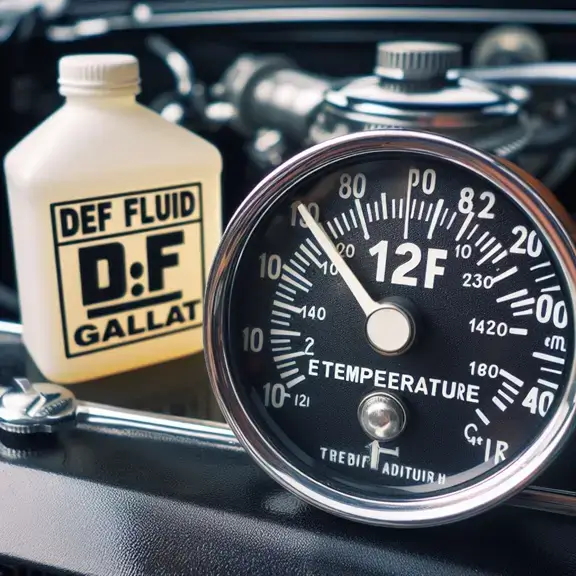
DEF has a lower freezing point than water due to the ratio of urea (a synthetic nitrogen compound). It freezes at 12 degrees Fahrenheit (-11 degrees Celcius). The urea concentration allows both parts of the compound to freeze at the same temperature and helps them thaw at the same rate without degrading the product.
Diesel exhaust fluid can freeze in storage containers and a vehicle’s tank. However, freezing will not compromise the quality of the DEF unless it remains frozen for a longer period. If DEF freezes in the tank, it will melt with the rise in temperature without affecting the operational effectiveness of the vehicles.
Consequences of DEF Freezing
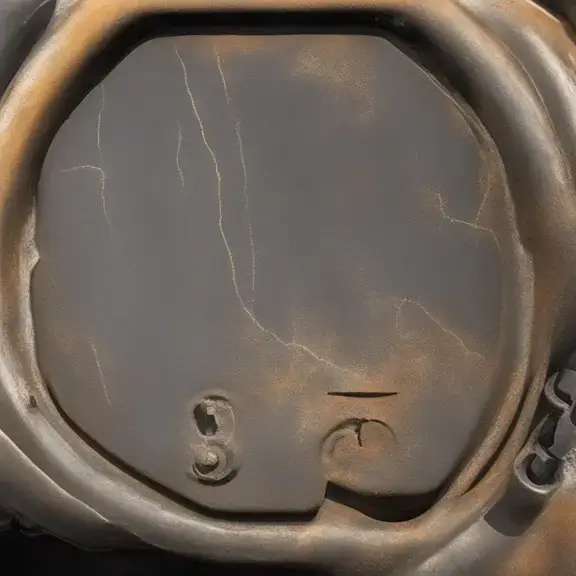
In winter, frozen DEF can stall your trucking operation completely. DEF freezing can lead to the following consequences:
- Frozen DEF can hinder the Selective Catalytic Reduction system’s ability to convert harmful emissions.
- Freezing may lead to incomplete emissions conversion, resulting in higher levels of pollutants being released into the environment.
- The frozen DEF expands by 7%, causing cracks in storage tanks, mainly when the tank is full.
How to Prevent DEF Freezing?
You must adhere to the following tips to prevent DEF freezing:
- Store DEF in a climate-controlled or heated environment to maintain a suitable temperature.
- Construct a wind barrier around the DEF storage using plywood to protect it from freezing temperatures.
- Check the DEF storage conditions and temperature to stay within the recommended range.
- Utilize vehicles equipped with heated DEF systems to prevent freezing in the tank.
- Keep DEF storage containers off the ground to prevent gelling due to cold floors.
Factors Influencing Freezing Point
The freezing point of Diesel Exhaust Fluid (DEF) depends on various factors. First and foremost, the quality of DEF plays a critical role. Furthermore, the appropriate urea concentration and deionized water make it less likely to freeze. Standard DEF has a freezing point of about 12°F (-11°C) due to its 32.5% urea content. However, impurities or variations in the mix can also affect its freezing point.
While additives can impact freezing points in other liquids, it’s essential not to use them in DEF. Adding anti-gel or antifreeze products affects the purity of DEF and causes it to work inefficiently in the selective catalytic reduction system.
Moreover, specific treatments to alter freezing characteristics should be applied carefully. Freezing temperatures generally don’t affect DEF quality, but exposure to direct sunlight can affect its functioning. It’s important not to store DEF in direct sunlight, even if frozen.
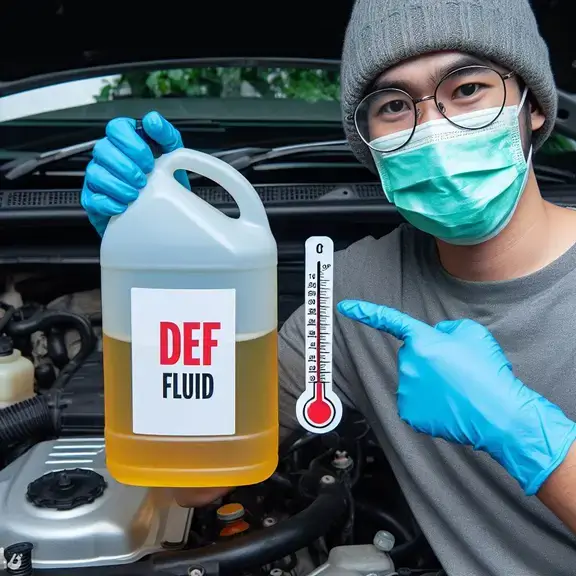
Tips for Handling DEF in Cold Weather
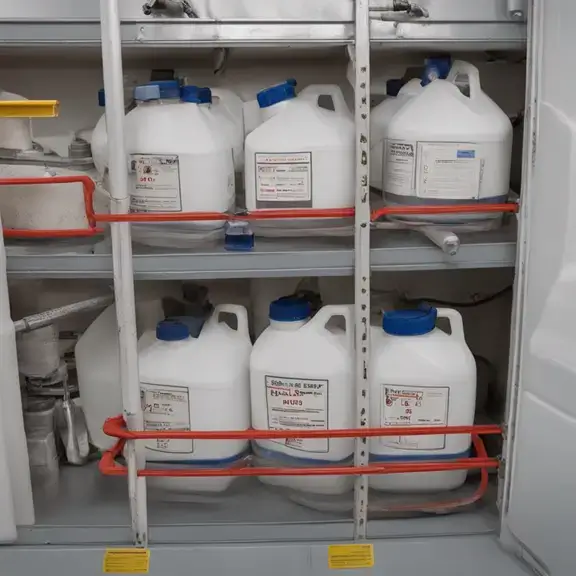
Handling DEF during winter to avoid freezing issues involves strategic measures for storage and usage.
- Store DEF in a controlled environment to avoid extreme temperatures.
- Regularly check DEF levels to prevent the tank from running low, as a lower urea concentration can increase the risk of freezing.
- Ensure DEF tanks are equipped with heating elements and insulation to prevent freezing.
- Allow the vehicle engine to warm up before driving if parked in cold conditions.
- Avoid using anti-gel or antifreeze additives in DEF holding tanks, as they can have adverse effects.
- Choose API-licensed DEF to minimize impurities affecting freezing points.
If DEF freezes despite precautions, avoid adding additives and allow the vehicle to sit in a warmer environment for natural thawing. Moreover, when drivers encounter frozen DEF, they must also take specific steps to address the issue when they encounter frozen DEF. They should refrain from adding additives to the tank to aid in melting, as DEF must remain pure for proper functionality.
The drivers must also preheat the vehicle and allow the engine to warm up before going on a journey, as it is an effective strategy for thawing the frozen DEF. However, if you are looking for expert advice on DEF solutions, visit Fuel Logic for expert guidance on DEF management in cold weather.
Environmental Impact of DEF in Cold Weather Conditions
Diesel Exhaust Fluid (DEF) is a fluid sprayed into the exhaust system to break down harmful nitrogen oxide (NOx) emissions. It helps mitigate environmental threats like global warming, acid rain, and visually impairing particles. However, when DEF freezes in winter, its effectiveness diminishes.
- Emissions Increase: A vehicle with a frozen DEF system might experience limited or altered performance of its Selective Catalytic Reduction (SCR) system. This could lead to increased emissions of harmful pollutants, such as nitrogen oxides (NOx), which the SCR system is designed to reduce.
- Environmental Regulations Compliance: In regions where strict emissions regulations are in place, a vehicle operating with a malfunctioning DEF system due to freezing might not meet these standards, potentially leading to environmental non-compliance issues.
Ultimately, it leads to the emission of more pollutants into the air, contributing to air pollution and environmental problems.
Now you know the temperature DEF freezes – what’s next?
We have explored the benefits of Diesel Exhaust Fluid (DEF) for diesel engine vehicles. We have also discussed how frozen DEF can compromise the SCR system’s efficiency, allowing harmful chemicals to be emitted into the air.
So, managing DEF in cold weather becomes mandatory for vehicle efficiency and environmental considerations. Proper storage, preventive measures, and understanding the consequences of DEF freezing are essential steps. They will help to ensure optimal performance and reduce the environmental impact of diesel engines in winter conditions.
Experience convenience and efficiency with DEF fuel delivery from Fuel Logic. Enjoy seamless, reliable service – ensure your vehicle stays powered without hassle. Contact us today for swift, top-quality fuel delivery.
How do you winterize diesel exhaust fluid (DEF)?
Winterizing Diesel Exhaust Fluid (DEF) involves key steps: keeping snow away from storage, elevating DEF storage off the ground to prevent gelling, and constructing a plywood wind barrier to protect against freezing temperatures.
How should DEF be stored in cold weather?
DEF should be stored in a climate-controlled environment to prevent freezing. The storage facility should have a heating system or insulation to ensure DEF remains liquid.
Is there a risk of DEF quality degradation after freezing?
The freezing of Diesel Exhaust Fluid (DEF) itself does not lead to quality degradation. DEF is a solution of urea and deionized water, and when it freezes, the urea and water components may separate into a slush-like state. However, DEF returns to its original homogeneous solution once thawed without losing quality.
Is there anything to put in DEF to keep it from freezing?
No, it is not recommended to put anything in Diesel Exhaust Fluid (DEF) is not recommended to prevent it from freezing. DEF must remain pure for proper functionality. Adding any additive or liquid can compromise its effectiveness.
Is DEF still good after it freezes?
Yes, DEF remains effective after freezing, and its quality is unaffected when it thaws. However, storing DEF in a temperature-controlled environment is recommended to mitigate the other potential effects of freezing.

